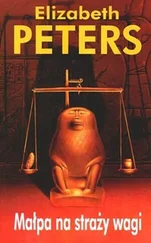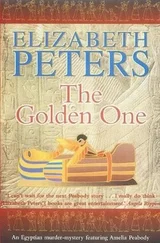There was only one other option. I ate the last chocolate and got into bed.
That must be the house I was told about,” I said, pointing. “It’s the only one around that fits the description. Do you know it, Feisal?”
Feisal leaned past me to peer out the window of the taxi. We had hired one of the nondescript vehicles that wait for fares outside the hotel.
“Yes, I know it. When are you going to tell us how you learned of this place and why it’s important?”
Saida whipped out her notebook. “Is it on my list?”
“How the hell should I know?” Feisal demanded. “Vicky—”
“Later. Just keep a lookout.”
Someone might reasonably have asked “What for?” The house was surrounded by a high wall made of whitewashed mud brick. Only the tops of trees and the roofline of the building inside were visible. A wooden double-leafed gate, wide enough to admit a delivery truck, was closed. Sitting next to it on a straight chair was a man wearing a raggedy galabiya and head cloth. He glanced incuriously at the taxi. There were a few other people around—two women robed in black towing a protesting child between them, a huddled figure apparently asleep under a dusty palm tree, a man driving a donkey cart piled with greenery.
The taxi driver addressed Schmidt, who was sitting beside him. “Is this where you wish to go? Shall I stop?”
“No!” I said emphatically. “Keep going. Slowly.”
I pushed Feisal away from the window and craned my neck as we cruised past. It was the back of the house in which I was interested. I couldn’t see much. The right angle of the wall went on for some distance. It was as blank and uninformative as the front wall.
“The effendi is not there,” the driver offered. “He lives in Cairo most of the year.”
“Who is living there now?” I asked.
The string of blue beads hanging from the rearview mirror tinkled musically as the taxi turned onto a road that led away from the house. “Strangers. Also from Cairo, perhaps. They have their own vehicles. They came a month ago. They are not friendly people. They do not buy at the local market.”
“What about servants?” I asked. “Have they hired local people?”
An expressive shrug. “No.”
I was sorry to hear that, though it didn’t surprise me.
“Where now, sitt?” the driver asked. He had apparently accepted the fact that I was the one in charge.
“A café,” said Schmidt promptly. “The nearest.”
An extremely chilly silence ensued, enlivened only by hostile glares from Feisal. My colleagues had realized they weren’t going to get the information they wanted while the helpful, English-speaking driver was present. He selected a place (probably owned by a friend or cousin) on one of the streets of town, away from the corniche. We accepted his offer to wait.
“Very nice,” said Schmidt, as we settled at a table.
Very nice and very empty. We were the only patrons. Feisal fizzed quietly like a lit fuse while Schmidt discussed food with the waiter. When the latter had gone into the kitchen, Feisal leaned forward, pushed aside a vase with two rosebuds in it, and planted his arms on the table.
“All right, Vicky, we went along with you on this expedition and refrained, as you requested, from questions. Now let’s have it.”
“I will tell you everything,” I said.
“Hah,” said Schmidt.
I did tell them everything. Almost everything. Schmidt’s eyes narrowed and widened, narrowed and widened, as I described my conversation with Suzi. Feisal’s eyebrows wriggled. Grinning, Saida took out her notebook and pen.
I stopped talking when the waiter came with our coffee. The usual alternative to Turkish coffee is Nescafé and a pot of hot water. I was happy to settle for that. There were no grounds involved.
Nobody had interrupted me. They were too busy trying to take in the flood of information I had supplied. Saida was the first to recover.
“As I expected! A woman is the first to make a vital discovery!”
“It’s a possible lead,” I said modestly. “She could have been feeding me a line. I didn’t see anything suspicious.”
“Precisely what you would expect to see if it were the headquarters of the gang,” Saida cried.
“Hmm,” said Feisal.
“What do you think, Schmidt?” I asked. I was beginning to worry about him. He had barely spoken, and I had hit him with the equivalent of a sockful of sand.
“I think,” said Schmidt, “that you are deceitful and dangerous. And even more clever than I had realized. At least you had the sense to let us in on this instead of going alone to reconnoiter.”
“I am all those things,” I admitted. “And so are you, Schmidt, so don’t give me a hard time.”
“I do not because I know what drives you,” Schmidt said. “But we will not speak of that. We agree, do we not, that the house is suspicious? Strangers who have been in residence for a month, who do not mix with the local population, who live behind high walls with a guarded gate. Suzi would have no reason to lie to you. She wants your help.”
“And she’s perfectly willing to use you as a decoy,” Feisal added. “Forget it, Vicky. Not even to retrieve Tutankhamon would I permit you to take such a chance.”
“Aw, gee,” I said, patting his hand. “That’s so sweet.”
“You are a dreadful woman,” Feisal said, without rancor. “Can’t you accept a statement of affection without making a joke of it?”
“No, she is afraid of serious emotions,” Schmidt explained. “We who love her accept this.”
“Shut up, Schmidt,” I said. “Please.”
Schmidt patted my hand. “It is a subject for another time, perhaps. Assuming that Suzi is speaking the truth, that house may be the present headquarters of the gang. In which case, Tut—er—he may be there.”
Lips pursed and eyes shining, Saida chortled, “Yes, he must be. And it is Vicky who has found the vital clue! A woman!”
Nerves were a trifle strained. Feisal turned on his beloved with a sneer. “As it turns out, you weren’t so clever, were you? He’s not on the West Bank. You were wrong.”
“Not at all,” Saida said serenely. “Mine was only one theory among others.”
“The first part of the scenario was right,” Schmidt said, before a jolly little lovers’ quarrel could develop. “They changed the look of the van while they were still on the West Bank, or transferred him to another, more inconspicuous, vehicle. No one would have paid particular attention to a small van or truck on the bridge or on the streets of Luxor. The house is isolated; they could drive straight into the courtyard. It is the right place. It must be. So. We go in tonight, nicht wahr ?”
His mustache bristled. I said, “If you mean go in, as ‘in with guns blazing,’ the answer is forget it. This is going to require some planning.”
“Exactly,” Feisal said, giving Schmidt a stern look.
We discussed it for a while. As Feisal kept telling Schmidt, we couldn’t involve the police without getting a warrant, for which we had no cause. Ashraf would go ballistic at that idea. The most interesting suggestion came from Saida.
“Vicky and I will approach the guard at the back gate. Yes, yes, Feisal, there is certainly a back gate. He will be disarmed by the appearance of two helpless, harmless females. We will persuade him to let us in. Then we will begin screaming for help. That will provide an excuse for you and the others to break in.”
Schmidt said, “No, we cannot allow you to take the chance. I will approach the guard, wearing a veil and habara.”
I said, “Not to disparage your powers of seduction, Schmidt, but—”
Feisal said, “What others?” Then he said, “That is the most absurd scheme I have ever heard, and if you suppose for one second that I will allow—”
Читать дальше








